Newsletter


Our Newsletter
Connections
Jan
31
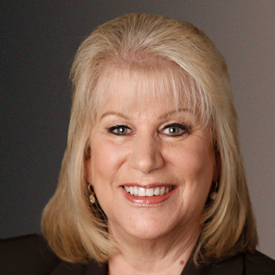
Susie Fishenfeld Named Vice President of Brandman Centers for Senior Care
Following nearly a decade of dedicated service at Los Angeles Jewish Health,
Susie Fishenfeld has been promoted to the role of vice president of the Brandman
Centers for Senior Care (BCSC), a Program of All-inclusive Care for the Elderly.
Fishenfeld, who has more than 35 years of experience in healthcare administration,
began her tenure at BCSC in November 2014.
In her role, Fishenfeld is responsible for corporate program operations, regulatory
compliance, fiscal management, quality improvement, patient and family satisfaction,
strategic planning, and program development and expansion.
In commenting on the promotion, Larissa Stepanians, chief operations officer
for Los Angeles Jewish Health, shared, "Susie is richly deserving of this promotion.
She is widely recognized in the field of senior care for her energy, enthusiasm,
and can-do spirit. Under her leadership, the participant census of our PACE program
continues to grow, providing even more seniors in the San Fernando Valley with our
award-winning senior care. Even throughout the COVID-19 pandemic, Susie ensured
our Center stayed open to care for those who needed a safe place to go and receive
services. Thanks to her dedicated service, we continue to grow, and, in fact, we
plan to open a new Brandman Centers for Senior Care location on Pico Blvd., on LA’s
Westside, this summer."
Prior to coming to Los Angeles Jewish Health, Fishenfeld served 17 years as senior
general manager for Vitas Healthcare Corporation, Vitas Innovative Hospice Care.
Before Vitas, Fishenfeld had a 13-year tenure at Encino-Tarzana Regional Medical
Center, where for her last five years she served as vice president of patient care
services.
Fishenfeld completed her undergraduate education at the University of California,
Berkeley, and received a bachelor of science in nursing from the University of California,
San Francisco. She holds a master’s degree in nursing from California State University,
Long Beach in Administration and as a critical care clinical nurse specialist.
Fishenfeld has been involved with many professional organizations throughout
the state of California, most recently, CalPACE where she is a member on the board
and prior officer serving as secretary. Holding
prior committee positions include both the California Hospice and Palliative Care
Association and the California Association for Health Services at Home. She
has also served on the executive committee for the Leukemia and Lymphoma Association.
Fishenfeld resides in the city of Calabasas with her husband Moe. She has two
children and four grandchildren.
Jan
4
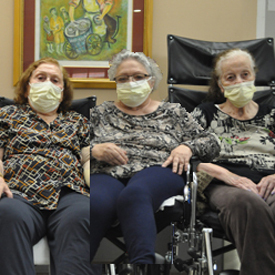
The Three Musketeers of Los Angeles Jewish Health
When Talat Barahmand, Iran Diansedgh, and Zaghi Kohan Ghadosh moved into Los
Angeles Jewish Health, they expected to find vital assistance in meeting their daily
critical care needs. What they did not expect was to find fast friendships that
would ease their transition to a new living situation and fill their days with joy.
The three women arrived at Los Angles Jewish Health not knowing one another:
Iran about six years ago, Talat around five years ago, and Zaghi, most recently,
approximately, three years ago. Sharing a common background (all are originally
from Iran) and a common language (Farsi), they quickly connected and have been inseparable
ever since.
Iran and Zaghi are roommates in the Mark Taper building; Talat lives across the
hall. Rabbi Karen Bender, chief mission officer at LA Jewish Health, refers to the
friends as "the Three Musketeers."
"They spend as much time together as possible, and it's just amazing,"
she says. "What a gift they have received and given to each other by finding
best friends at this stage of life!"
Iran, 100, is a native of Teheran; she and her husband fled after the Islamic
Revolution. They landed in Dallas, Texas, where they had a daughter, son-in-law,
and grandchildren, and spent roughly 15 years living there before making their way
to Southern California, home to their other two children. Her husband passed away
in 2007, and she lived on her own until her health and advancing age made independent
living impossible.
As Iran tells it, her experience at Los Angeles Jewish Health has been excellent
– the people and the service have all been wonderful. She is especially grateful
to be able to spend her days alongside Zaghi and Talat.
"We do everything together: playing bingo, attending Shabbat services, listening
to music," she says. "We're all really happy."
Of course, there are occasional disagreements; all three women prefer to see
themselves as being in the right. "We may argue, but there are no actual fights!"
Iran laughs.
Zaghi, 90, has been in the United States for two decades. She came from the Iranian
city of Shiraz, which she fled because of the increasing intolerance of the authoritarian
government. In Iran, Zaghi's family was quite wealthy, but during the revolution
they lost everything: their home, the two cinemas they owned, and extensive property
holdings.
Los Angeles made sense as a destination because two of her five children lived
here. It was difficult to adapt to an unknown environment, but with her family's
support she built a new life. "I miss Iran, but I like California," she
says.
When mobility issues made it clear she could no longer live without assistance,
she moved into Los Angeles Jewish Health and was thrilled to meet people with similar
backgrounds. "My friends are the best, and I love talking with them,"
she says. "We chat, we watch Persian TV, and sometimes, as Iran pointed out,
we argue. But we always stay close."
At 86, Talat is the youngest of the group. She and her husband, along with one
of their three daughters, emigrated from Iran in 1996 as a result of religious persecution,
making their way to Los Angeles, where their other daughters and their son already
lived. It was a difficult move, but they were thrilled to be reunited with family
and away from a repressive regime.
After Talat's husband died in 2011, her deteriorating vision made living alone
a health hazard, and she chose to take up residence at Los Angeles Jewish Health.
The decision, she says, was a good one. "I love it here. They take such
good care of me, and everyone is very friendly."
Talat is extremely outgoing, and having her friends as a social outlet has been
a godsend. "Zaghi, Iran, and I all help each other. We're all Jewish, and it's
so nice to be able to speak Farsi and to have people I get along with so well."
Rabbi Bender says the Three Musketeers' friendship is as special as the women
themselves. "When I greet them 'Shabbat Shalom,' they will often respond not
only by saying, 'Shabbat Shalom,' but also by giving me a blessing. It's truly an
honor to have three such wonderful women living here with us."
Seeing Zaghi, Talat, and Iran interact every day has led Rabbi Bender to marvel
at how fortunate they are to have formed such a tight-knit bond.
"If I spoke Farsi, I would petition to become their Fourth Musketeer!"
she says.
Jan
4
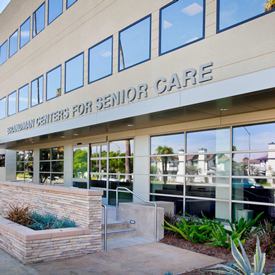
When It Comes to Serving Seniors, Los Angeles Jewish Health Keeps Up the PACE
Life expectancy in the United States is on the rise. As Americans live longer,
older adults are increasingly searching for ways to age in place—and to remain
in their own homes for as many years as they can. Enter the Brandman Centers for
Senior Care (BCSC), a Program of All-inclusive Care for the Elderly (PACE). Launched
by Los Angeles Jewish Health and generously funded by Joyce and Saul (of blessed
memory) Brandman, BCSC immediately distinguished itself as the San Fernando Valley's
first PACE program. Today they serve 320 senior participants, providing them
a one-stop shop for meeting their comprehensive health needs.
The Brandman Center's primary objective is to help seniors remain as independent
as possible, living safely in their homes and communities. It works to achieve this
goal through the provision of well-coordinated, highly-personalized, quality care,
with a broad range of services that promotes seniors' health and fills their days
with meaning and joy.
"Our offering truly is all-inclusive, covering everything from medical care,
specialty services, and rehabilitative care, to nutritional counseling, nursing
and preventive services, medications, medical supplies, and more," says Susie
Fishenfeld, BCSC executive director. "One of the best parts is that participants
never get a bill; as long as they use our providers, we handle everything."
With an interdisciplinary staff that includes a primary care physician; medical
specialists; a nurse; social worker; occupational, speech, and physical therapists;
personal care attendants; and a dietician, BCSC is open five days each week, year-round
(excluding holidays) from 8:30 am to 5 pm. Seniors become eligible when they are
age 55 or older, live in the BCSC service area, and have been deemed by the team
at BCSC and the California Department of Health Care Services to require nursing
home-level of care.
Unlike with regular health insurance, such as Medicare or MediCal, there is no
specific enrollment period for BCSC's PACE program; seniors can sign up at any time.
There are other key differences, as well.
"We provide more than just what people typically think of as 'healthcare,'
like doctor appointments and prescriptions," Susie notes. "So often, seniors
are just sitting home, watching TV all day; we actually get them out and bring them
to our center, where there are all kinds of wonderful activities for them. To see
how they thrive when they get here is really quite amazing."
Evelyn Frenkel, BCSC's director of marketing, agrees that, when it comes to BCSC,
seeing really is believing. "We just had a large holiday gathering, with music
and dancing," she says. "As people arrived, you could tell they were just
lighting up inside. It was wonderful."
Part of what makes BCSC so dynamic is its diversity. "We have so many languages
and cultures represented, and all religions," Susie says. "Forty percent
of our participants are Hispanic. And the diversity goes beyond background: Some
participants work; some drive. Everyone is at a different stage in life, yet they
all come together to create this beautiful community."
The census at BCSC, which continues to grow, is now the highest since the program
started in 2013—and talking to participants, it's easy to see why.
"I love all of the activities, I love the dancing and the music. I just
love it all," says Rose Robinett, who has been coming to BCSC since 2016.
One of BCSC's most ardent fans was William Kreiling, a devoted participant who
has since passed away. His expert summary of the prevailing sentiment about BCSC: "If
you look all over LA, you are not going to find a better organization than this
one."
Dec
7
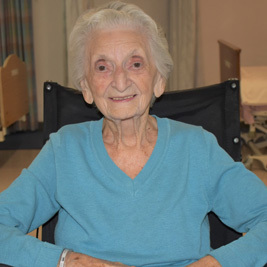
A Life of Resilience—An Inspiration for All
Katherina "Katy" Schaffer knows what it means to face extraordinary odds. But
she has also experienced, first-hand, the triumph of perseverance. Over the
course of her 97 years, Katy has faced unimaginable challenges, including time
spent in three Nazi concentration camps. Through them all, she has proven time
and again she has the strength of spirit to carry on—and, above all else, that
she is a true survivor.
A resident of Los Angeles Jewish Health's
Grancell Village for the past year, Katy's story starts in 1925, in pre-war
Czechoslovakia. One of six siblings, at the age of 19 she traveled to a
neighboring town to become an apprentice seamstress. As Europe fell under the
cloud of Nazi threat, her parents sent word that she should return home. On her
way back, at a train station in the company of her older sister, Katy was
abducted by the Germans. So began an odyssey that would subject her to the
unimaginable horrors of the Holocaust and leave her at death's door.
"When my mom was liberated, in 1945, she remembers airplanes dropping little
bags of cheese and bread. Some people she knew in the camps, who were on the
brink of starvation, ate so much that they died—their systems couldn't handle
all that sustenance at once," says Katy's daughter, Erit Siegal. "Fortunately,
she restrained herself, and she eventually made it to a hospital, where she
recuperated for a long time."
After she was liberated, Katy traveled to
her native Czechoslovakia, only to find that, aside from two sisters and a
brother, her entire family had perished in the Holocaust. She and her siblings
eventually emigrated to Israel, where she met her husband Otto and gave birth to
Erit. By then, one sister had moved again—this time, to Los Angeles—and Katy
and Otto decided to join her.
Katy and her family—which soon expanded
to include a son, George—thrived in Southern California. Otto worked in the
garment industry; Katy was a homemaker who cooked, sewed clothing, and provided
a warm and loving environment for her children in the house they purchased in
the San Fernando Valley in 1963. Despite the hardships she had endured, she
found fulfillment and success.
"I always tell people to learn from their
parents and neighbors, to follow Jewish values, to help the poor, and to be a
mensch," she says.
Husband Otto passed away in 2011; Katy stayed in
their home for another decade or so. Among the hobbies she took up during this
period was volunteering for seven years at Los Angeles Jewish Health (LAJH), in
the Arts and Crafts Room on the Eisenberg Village campus. "I've always felt
that, wherever I can help, I help," she says. "Giving back to LAJH was a way for
me to contribute."
Katy came to Los Angeles Jewish Health as a resident
via our short-term rehabilitation program after falling and fracturing her
spine. While in rehab, the vascular disease she had in her leg progressed,
ultimately resulting in the amputation of her leg. She moved into Los Angeles
Jewish Home full-time just over 12 months ago.
"Mom has always been
incredibly active, and losing her leg was so traumatic," Erit recalls. "But it's
kind of miraculous how she's adapted and adjusted. I think her experience in the
war contributed to her being able to deal with her current situation—these
survivors have something special in them that has enabled them to carry on."
Today, Katy keeps her mind and body active and agile through knitting,
doing word searches, and reading. Already during her brief tenure at LAJH, she
has developed a reputation for her trademark resilience and positive energy.
"Katy is an extraordinary person, and it's an honor to have her residing here at
Los Angeles Jewish Health," says Rabbi Karen Bender, LAJH's chief mission
officer. "She never allowed the atrocities she witnessed and experienced during
the Shoah to interfere with her ability to embrace life, and it's no wonder all
of the staff adore her. I personally love spending time with Katy. Her smile
inspires me!"
For her part, Katy is grateful for the blessings of family
and the benefits of living at Los Angeles Jewish Health. "My children and four
grandchildren keep me going," she says. "And I appreciate LAJH: I like the
kosher food, I've made friends with my roommate, and Dr. Marco and my nurses are
right here to help take care of me. I love it here—other places are just not
the same!"
Dec
7
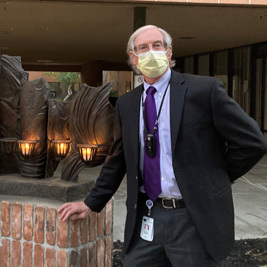
Celebrating the Wonder and the Miracle of Chanukah
To borrow from Adam
Sandler, "Chanukah is the Festival of Lights. Instead of one day of
presents, we have eight crazy nights". From those words of wisdom, we
get the questions to address. What is this Festival of Lights?
Why eight nights? In addition, while sufganiyot (jelly doughnuts) and
latkes (potato pancakes) are awesomely delicious, why are they associated
with Chanukah?
In the larger universe of Jewish holidays, Chanukah
is known to be a minor observance. It certainly is not a holiday or
observance on the level of Passover or Sukkot, let alone Rosh Hashanah.
Even as we know Chanukah is a minor festival, Chanukah is beloved and its
existence is widely known, if not understood. Here in America,
Chanukah gets extra exposure because of the proximity to the Christmas
holiday. Christmas is always December 25 but Chanukah follows the
Jewish-Lunar calendar and can occur as early as Thanksgiving or fall in the
later part of December. In that range of dates, Chanukah falls during
what is commonly called the Holiday Season and becomes incorporated into it.
That takes us to a uniquely American ideal about the make-up of our
nation. We inscribe on the coins of our currency E Pluribus Unum- or
in the English "Out of many one". In America, we celebrate being
united; additionally we treasure what makes each part of the American mosaic
unique. As the majority of Americans observe one holiday, Americans of
the Jewish faith observe Chanukah. At its core, Chanukah is the
celebration of maintaining that uniqueness. In the days following the
breakup of the empire of Alexander the Great, the dominant culture in the
Mediterranean world was the Greek culture. It would have been easy and
made their lives simpler for the Jews of those times to be swallowed by that
Greek culture. Yet, they refused, they rebelled against assimilation
and they elected to fight to maintain the faith and identity they inherited
from their ancestors. At the conclusion of this struggle to remain
unique in a larger culture, it was time to dedicate the great Temple in
Jerusalem. Part of the dedication or Chanukah was lighting the
menorah. On hand was only enough oil to last 1 day. It would
take several days for more oil to be procured. Rabbinic legend is that
the oil that should have lasted for 1 day actually lasted eight. For
that reason, we light candles in ascending numbers each night, to remember
this miracle of the oil lasting. In observing Chanukah, we celebrate
our unique identity in a larger world. Jews chose to retain the faith
of those who came before us and treasure that faith and uniqueness in a
diverse world.
Finally and very importantly, why the latkes and
sufganiyot? They are both linked to the miracle of the oil, as they
both are fried foods. When I was a student in Israel, I marveled
at the wide variety of sufganiyot-doughnuts on sale in every store and
bakery. Naturally, I had to sample a cross section. My favorite?
The chocolate frosted-halvah filled doughnut was the winner. Latkes
are potato pancakes of course. There are many different recipes for
them. You can use potatoes, sweet potatoes or even zucchini.
Among the many toppings can be applesauce, sugar or what I recommend, sour
cream. All are wonderful, all tasty without a doubt.
Nevertheless, what is valued is to pause, gather together to bless and light
the candles, sing the traditional songs and celebrate the wonder and miracle
of Jewish identity in our day and time.
Nov
1
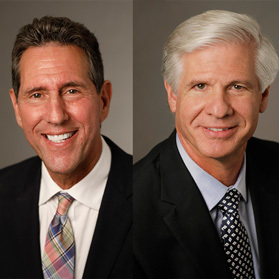
So Very Much to Be Grateful For This Season
Andrew Berman, Chair, and Dale Surowitz, President & CEO
As we enter the month of November, known for giving and giving thanks, we would like to take this
opportunity to reach out and share our heartfelt thanks and gratitude for all of
the support provided to the seniors of Los Angeles Jewish Health.
Once again,
your donations, coupled with the outstanding work of our Los Angeles Jewish
Health teams, meant our High Holidays were moving and meaningful for all who
participated. Our outstanding rabbinical leaders were joined by dozens of
additional staff from across departments including Dietary, Housekeeping,
Activities, Information Systems, Maintenance and many others, who came together
to produce special events and programming that resonated with all who
participated.
We are also grateful that, this year, we were able to open our
campuses to a modest number of family members to join with their loved ones in
person for services, even as we continued to follow all ongoing health
regulations still in place due to COVID-19. May next year bring even bigger
services, gatherings and celebrations!
For everyone who has supported the
work of Los Angeles Jewish Health this year, as we care for nearly 4,000 older
adults, nearly 80% of whom are at or near national poverty levels, you have our
collective thanks and deep appreciation. With the coming of Giving Tuesday on
November 29, and as you make your year-end gifts; please consider contributing
to Los Angeles Jewish Health.
As our senior population continues to grow
exponentially now and into the future, we are proud and privileged to be
available to serve them. Without your support, we could not provide these
outstanding services and programs or the award-winning care our seniors so
richly deserve.
Warmest regards and best wishes for the holiday season.
Andrew Berman
Dale Surowitz
Chair, Board of Directors
Chief Executive Officer & President
Nov
1
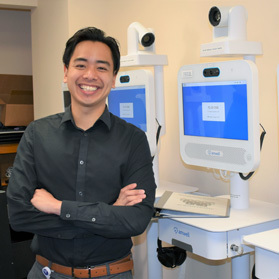
Los Angeles Jewish Health A Leader in Telehealth for Seniors
Identifying impactful ways to optimize the well-being of older adults is a central focus of
our work at Los Angeles Jewish Health (LAJHealth). We are constantly seeking
innovative approaches to raising the bar on clinical care, and our telehealth
program is a case in point, leveraging leading-edge technology to ensure our
seniors can thrive.
Launched with funding from the Federal
Communications Commission (FCC), which selected LAJHealth as the lead grantee in
California to pilot a telehealth program, our organization's initiative deploys
state-of-the-art mobile carts—each equipped with a tablet computer, digital
stethoscope and otoscope, a camera, speaker/microphone system and WIFI—
throughout Los Angeles Jewish Health campuses, enabling physicians to care for
patients, from a distance, in an individualized and caring way. Whether for
routine visits or to assess changes in medical condition, telehealth
appointments offer patients, families and physicians a wide range of critical
advantages.
"In any discussion of the telehealth program, it's first
important to stress that this is not just doctors seeing residents over Zoom or
FaceTime," notes Noah Marco, MD, chief medical officer with Los Angeles Jewish
Health. "These are highly sophisticated, patient-centered encounters through
which we are actually able to hear and evaluate heart and lung sounds, look
inside patients' ears and mouths, and see their tiniest skin lesions."
"Our experience has been that, once patients and their loved ones become
comfortable with the technology involved, the benefits of telehealth are
immediately apparent to them," he says.
Patient convenience is one of
the major benefits. "For many of our residents, travel to and from physicians'
offices can be challenging at best, causing them to disrupt their routines to do
what's convenient for their doctor," Dr. Marco says. "Telehealth
alleviates this burden, allowing them to check in with their doctors and share
any concerns from the comfort of their own rooms."
Anton Domingo, a
registered nurse and LAJ Health's telehealth program manager and quality
analyst, says the telehealth consults are particularly helpful when a resident
is experiencing a change in condition.
"In more urgent situations, when
we need to determine whether a resident may need to be transferred to the
hospital, a telehealth appointment gets the doctors' eyes on the patient almost
immediately, allowing the provider to see the patient and correlate the data
provided with the patient's status in real time," Anton says. "This translates
to better, more informed decision-making about the necessity of hospital
transfers, which ultimately means less strain on—and less cost for—our
residents."
In fact, according to data gathered by LAJHealth as part of
this pilot program, telehealth visits lessened the need for nearly 20 percent of
transfers to acute care facilities.
The pandemic has further highlighted
the wisdom of including telehealth options in patient care. "For instance, say a
patient needs to be in isolated care due to a transmittable disease, we can
dedicate a telehealth cart to that area, making sure the resident has easy and
timely access to the provider he or she needs for their care," Anton says.
The telehealth program also lets residents' families play a more active role as
a member of their comprehensive care team. "When the patient, the provider and a
family member come together, we get more and better information, and the quality
of the care inevitably improves," Dr. Marco says. "Family members really benefit
from hearing from their loved ones' physicians directly because it puts everyone
on the same page and ensures we answer everybody's questions in a comprehensive
way."
Erit Siegal and her mother Katherina Schaffer
That was the case for Erit Siegal, whose mother, 97-year-old Los
Angeles Jewish Health resident Katherina Schaffer, signed up to participate in
the telehealth program. "My mom, who is originally from Czechoslovakia and
survived three different concentration camps, is miraculously healthy and 100
percent cognitively fine. She's one tough cookie," Erit says. "She moved to
LAJHealth about a year ago. When she needed some routine care, she saw Dr. Marco
via telehealth, and I was on the call, as well."
"It was a good
experience," she continues. "Dr. Marco asked questions, my mom answered, and I
was there, watching and listening the whole time. It was super convenient,
especially during COVID, because we got the attention we needed while minimizing
interruption to my mom's day and limiting the exposure she (and other residents)
would have had if I had needed to come to campus for the appointment."
LAJHealth currently has 25 telehealth carts; 12 of them are deployed across four
different facilities, resulting in more than 40 virtual visits so far this year.
It's a promising start, and plans are for the program to expand. That expansion
– and the program itself—are the result of generous support not just from the
FCC, but also from numerous individuals and foundations.
"We've seen
telehealth add real value for so many of our residents, and we look forward to
making the program even more accessible going forward," Dr. Marco says. "At Los
Angeles Jewish Health, we work to give each of our seniors every health
advantage possible."
Oct
3
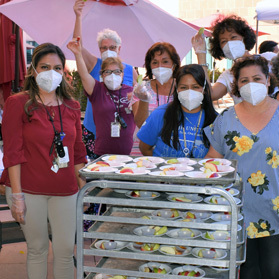
At Los Angeles Jewish Health, High Holy Days Bring Blessing of Community
Los Angeles Jewish Health residents always approach the High Holy Days with a
sense of deep appreciation for having reached the start of another New Year.
This year, our seniors have found even more reason to be grateful: the loosening
of COVID restrictions to allow residents to celebrate the holidays with their
loved ones.
"It's hard to put into words how exciting it is that, this
year during the High Holy Days, we've finally been able to invite a small number
of family members back onto our campuses," says Rabbi Karen Bender, Los Angeles
Jewish Health's chief mission officer. "Over the past several years, in order to
keep residents as safe as possible, we were mandated to hold off on inviting
visitors to campus, so these High Holy Days have really signaled a dramatic,
welcome change."
Rabbi Bender says services have been packed and that
events leading up to Rosh Hashanah and Yom Kippur were equally well attended.
"We held an apple and honey tasting across multiple campuses, which was
really wonderful," she says. "Taste and smell are two of the most powerful ways
to conjure up memories that can engage our residents and inspire them to share
their thoughts, feelings and life experiences."
According to Rabbi
Bender, the apples and honey gatherings were significant for another reason, as
well. "I like to point out to our residents that we don't hand people apples
already dipped in honey; we give them the apples, and they dip them on their
own," she says. "It's a symbol that every individual has the ability to
influence the sweetness in his or her own life. We're more empowered than we
think, and I believe that's a critical message for our incredible population of
seniors."
The run-up to the holidays also included a special mitzvah
project: Residents gathered together to assemble fully-stocked backpacks for
students in need. Sponsored by generous Los Angeles Jewish Health donor Bill
Prady, co-creator of the Emmy Award-winning television sitcom "The Big Bang
Theory," the project allowed residents to partner with School on Wheels, a
nonprofit organization that fields approximately 4,000 requests each year for
backpacks from students experiencing homelessness. Los Angeles Jewish Health
participants worked a fun assembly line-style to fill the backpacks with school
supplies such as paper, pencils and folders, as well as special items such as
puzzles, books and science kits.
"Jewish tradition teaches that we are
inscribed in the Book of Life at Rosh Hashanah, and that the book is sealed at
Yom Kippur," Rabbi Bender says. "One of our goals with the backpack project was
to fulfill the commandment of the High Holy Days machzor (prayer book), which
encourages us to focus these Days of Awe on tefilah (prayer), tzedakah (charity)
and t'shuvah (repentance). This project enabled seniors to perform an act of
tzedakah, and they were so happy to be a part of it."
Their enthusiasm,
Rabbi Bender notes, was beautiful to see. "A significant percentage of our
residents are recipients of other people's good deeds, whether it's our donors,
our volunteers or members of the larger community. It's challenging for them to
find opportunities to give back and make a difference the way they used to, when
they were more independent," she says. "Through this project, they were able to
realize they can still do things to help other people. It was truly thrilling to
watch and was easily one of the most moving things I've done in my time here."
As they were filling backpacks, dipping apples in honey and singing at
in-person holiday services, our residents enjoyed the benefits of built-in
community that living at Los Angeles Jewish Health makes possible.
"How
many people in their 90s get to be with their peers at holiday time?" Rabbi
Bender asks. "Not many, which is why our events this year have been so
meaningful. It's such a blessing and a privilege to belong to this community."
Oct
3
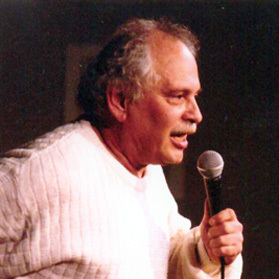
Comedy and Camaraderie at Los Angeles Jewish Health
Michael Preminger is always quick to find the joke. It's a quality the
veteran stand-up comedian, who has been performing on some of the nation's most
prestigious stages for decades, brings with him as a dedicated volunteer at Los
Angeles Jewish Health (LAJH).
"The residents at Los Angeles Jewish
Health are hilarious and such a joy to be around," Michael says. "When I first
started volunteering, I asked a lady named Edna, who was 104, whether she would
ever consider dating younger men. Without missing a beat, she looked at me and
said, 'Are there any other kind?'"
That camaraderie and humor have been
bringing Michael back to LAJHealth as a volunteer for more than 10 years. Career
success was professionally satisfying (his many television appearances have
included The Tonight Show, The Merv Griffin Show, The Dinah Shore Show, and
more. He also co-wrote the critical and commercial hit Nothing in Common
starring Tom Hanks and Jackie Gleason), but it is his weekly visits to LAJHealth
that give him rich personal rewards.
"I've learned so much from the
residents and have gained a lot of wisdom. I remember one woman named Rita who
would say in Yiddish, 'Vos geven iz geven'—essentially, 'What was, was.' I
think it's a very profound way of looking at the world, essentially
acknowledging that we can't recapture the past, we can only look ahead," Michael
says.
One of the things he loves most about volunteering at LAJHealth is
hearing residents' stories. "One person told me she went dancing with the
Dodgers when they were still in Brooklyn!" he exclaims. "These folks have done
such incredible things, and through their stories, I feel I've been all over
with them, from Brooklyn to Buenos Aires."
Michael himself has New York
roots: Born in the Bronx, he headed to Los Angeles in 1975 to pursue his passion
for showbusiness. He raised a son and a daughter while climbing the rungs of
comedy stardom. Now a grandfather, his touring days have slowed down, and he is
able to enjoy other pursuits like giving back to Los Angeles Jewish Health.
"I mainly do trivia with the residents, quizzing them on old movies, TV shows,
and music," he says. "Some of them really know their stuff, and the questions
lead to super interesting conversations about their lives."
As a veteran
of the entertainment industry, Michael would like to see more of his colleagues
doing their part to uplift older adults at LAJHealth. "Especially in this town,
where you have thousands of actors and comedians just sitting around all day
waiting for their agents to call, I'm astounded by how few people make it a
priority to volunteer," he muses. "They have the time; they should come join
us!"
Michael arrives at LAJHealth every Tuesday and Thursday like
clockwork, and he says it's consistently the highlight of his week.
"Volunteering here is one of the best things I've ever done in my life; it's so
fulfilling, and I get such a high from it," he says. "The hours between Tuesday
and Thursday always feel too long—I just can't wait to come back!"
Los
Angeles Jewish Health is currently recruiting volunteers of all ages (18 and up)
– from individual adults to school groups and synagogue youth groups. Contact
Stacy Orbach, director of volunteer services, for more information: (818)
774-3219 or [email protected].